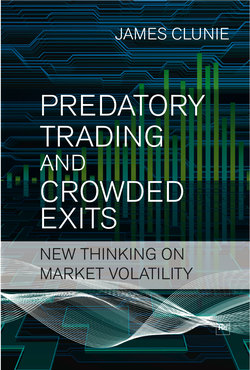Читать книгу Predatory Trading and Crowded Exits - James Clunie - Страница 20
На сайте Литреса книга снята с продажи.
Adaptive markets
ОглавлениеLo (2004) introduces the adaptive markets hypothesis, in which the “dynamics of evolution – competition, mutation, reproduction and natural selection – determine the efficiency of markets” and the success or otherwise of investment strategies. The author argues that many of the common apparent mistakes made by investors (such as the tendency of investors to avoid realising losses) can be explained by “an evolutionary model of individuals adapting to a changing environment via simple heuristics.”
If we think of markets in this way, then survival can become more important to a trader than maximising expected utility within a rational-expectations framework. Traders learn, through trial and error and natural selection, rules or heuristics for survival. In a relatively stable environment, these heuristics adapt to become roughly optimal solutions. If economic conditions change, there is a risk that such heuristics became maladaptive. Markets history matters, through the forces of natural selection. Furthermore, aggregate risk preferences are path dependent under this framework. Arbitrage opportunities do exist from time to time. As economic conditions change, new markets are created, new species emerge and others die out. Investment strategies will vary in successfulness, depending on the economic environment and market ecology.
How does this ecological view of markets relate to more traditional perspectives?
According to Lo, the notion of efficient markets concerns “the steady-state limit of a population with constant environmental conditions” and behavioural finance concerns “specific adaptations of certain groups that may or may not persist, depending on the particular evolutionary paths that the economy experiences”. Thus, the adaptive markets hypothesis can reconcile many of the apparent contradictions between the two dominant views on how prices are set.
The high mortality rate for hedge funds can be understood better by considering them as a species within the market eco-system. Prolonged negative returns hinder their economic viability and can lead to the exit, or death, of the hedge fund. By knowing who is vulnerable, who is making mistakes and from where your next meal is likely to come, the trader builds up an edge within the market eco-system.
In particular, good knowledge of popular strategies employed in the market, and an understanding of any behavioural anomalies in other agents, is required. Each player attempts to exploit the behaviour of others. In the short-run, optimal portfolio allocation rules depend on the ecology of the market, but in the long-run, under-diversified portfolios can be driven out by a small group of invading agents.
